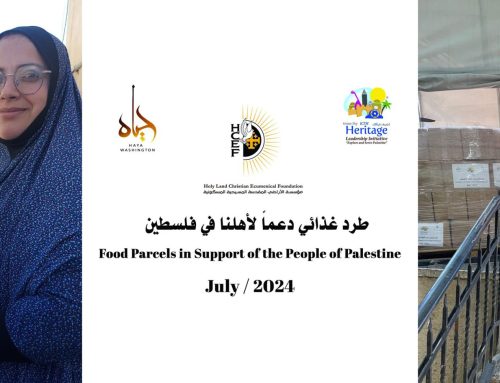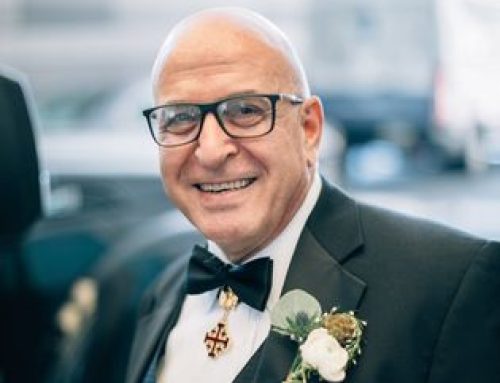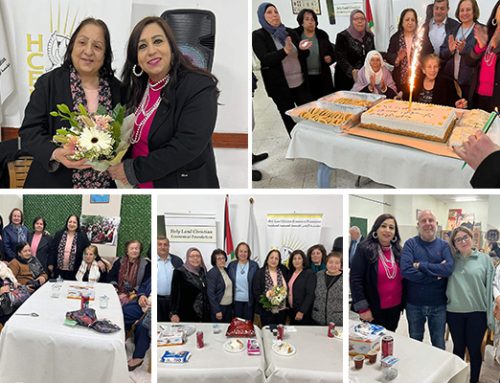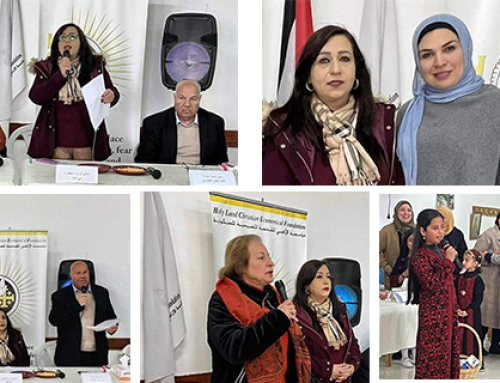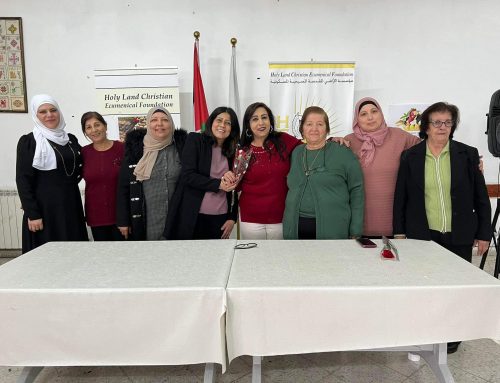The Roman Catholic and Episcopal churches in San Antonio came together in the Holy Land Christian Support Network (HCSN) to offer an inspiring ecumenical symposium on the plight of Holy Land Christians. On Saturday, April 26, 2003, fifteen different speakers affiliated with the Holy Land Christian Ecumenical Foundation (HCEF) painted a picture of life for Christians in the West Bank and Gaza and described several HCEF programs that have proven to be an excellent means of supporting Holy Land Christians both spiritually and materially.
Press Release
The Holy Land Christian Ecumenical Foundation (HCEF)*
Holy Land Christian Support Network
San Antonio HCSN Unites Local Christians in Support of Holy Land Christians
The Roman Catholic and Episcopal churches in San Antonio came together in the Holy Land Christian Support Network (HCSN) to offer an inspiring ecumenical symposium on the plight of Holy Land Christians. On Saturday, April 26, 2003, fifteen different speakers affiliated with the Holy Land Christian Ecumenical Foundation (HCEF) painted a picture of life for Christians in the West Bank and Gaza and described several HCEF programs that have proven to be an excellent means of supporting Holy Land Christians both spiritually and materially.
Most Reverend Bishop Patrick Zurek, DD, Auxiliary Bishop of San Antonio, described the Christian history of the diocese of Jerusalem since 1600. He also emphasized that the bond that American Christians share with Holy Land Christians requires that we in the United States help to preserve our Christian heritage by helping to support the Christians who remain in and worship in the land of Christ’s birth, death, and resurrection.
Speakers from the Holy Land and pilgrims from the United States described the malnutrition, the economic crisis (70% unemployment), the home demolitions, the checkpoints that hold the population hostage, and the closures that continue for weeks and months at a time. Fr. Majdi al-Siryani, the pastor of the Latin parish in Beit Sahour, could not attend the symposium because the Israeli government continues to deny him and other clergy the necessary residency status for traveling outside of Palestine. By speaker phone, Fr. Majdi described the daily difficulties that clergy face in their churches including the fact that they are only three miles from Jerusalem but are denied the ability to travel to Jerusalem for Holy Week and Easter services. In spite of the difficulties, the churches are the main source of infrastructure these days. When local people need help (food, jobs, medicine), they turn to their churches first.
Paul Beran, Lecturer, North Eastern University, Boston, discussed the difficulty posed by the fact that Zionist Christian organizations exacerbate problems faced by the indigenous Christian community. He emphasized the need to continue to reach out to Americans to explain the existence and struggle of the Christians who have been in the region since Christianity first began in the person of our Savior 2,000 years ago.
Fr. Emil Salayta, from the Latin Patriarchate in Jerusalem, noted that the last two years have been particularly devastating for the entire Palestinian community, including the Christian minority, and each speaker emphasized the urgency of reaching out to Holy Land Christians before it is too late – before they have all been forced to emigrate because of the unbearable difficulty of remaining in their homes. Fr. Salayta likened the Church of Jerusalem to the Church of Golgotha. The suffering of local Christians compels us, according to Fr. Salayta, to work for a just peace and to support our Mother Church in her dire situation.
The symposium was a great success for the newly established San Antonio HCSN Committee headed by Deacon Tom and Mary Jane Fox, and it provides inspiration to other HCSN committees in Texas who are working on similar projects to begin educating their local communities. Rateb Rabie, HCEF President, expressed great pride in the tireless efforts of the San Antonio HCSN committee and the standard of excellence that they set forth in this symposium. “The collaboration of the various Christian churches in San Antonio is an inspiring model for future symposiums in other cities.”
******
*The Holy Land Christian Ecumenical Foundation is a tax-exempt, non-profit organization, committed to improving the lives of Christians in the Holy Land through building bonds of solidarity with between Christians in the United States and Christians in the Holy Land. We have two goals: inform Americans about the Christians in the Holy Land and provide humanitarian assistance for the needy in the land where Jesus Christ was born, preached, died and rose again. HCEF, 6975 Wisconsin Avenue, Bethesda, MD 20815 (301)951-9400, Toll Free (866) 871-4234, www.hcef.org Email: news@hcef.org

